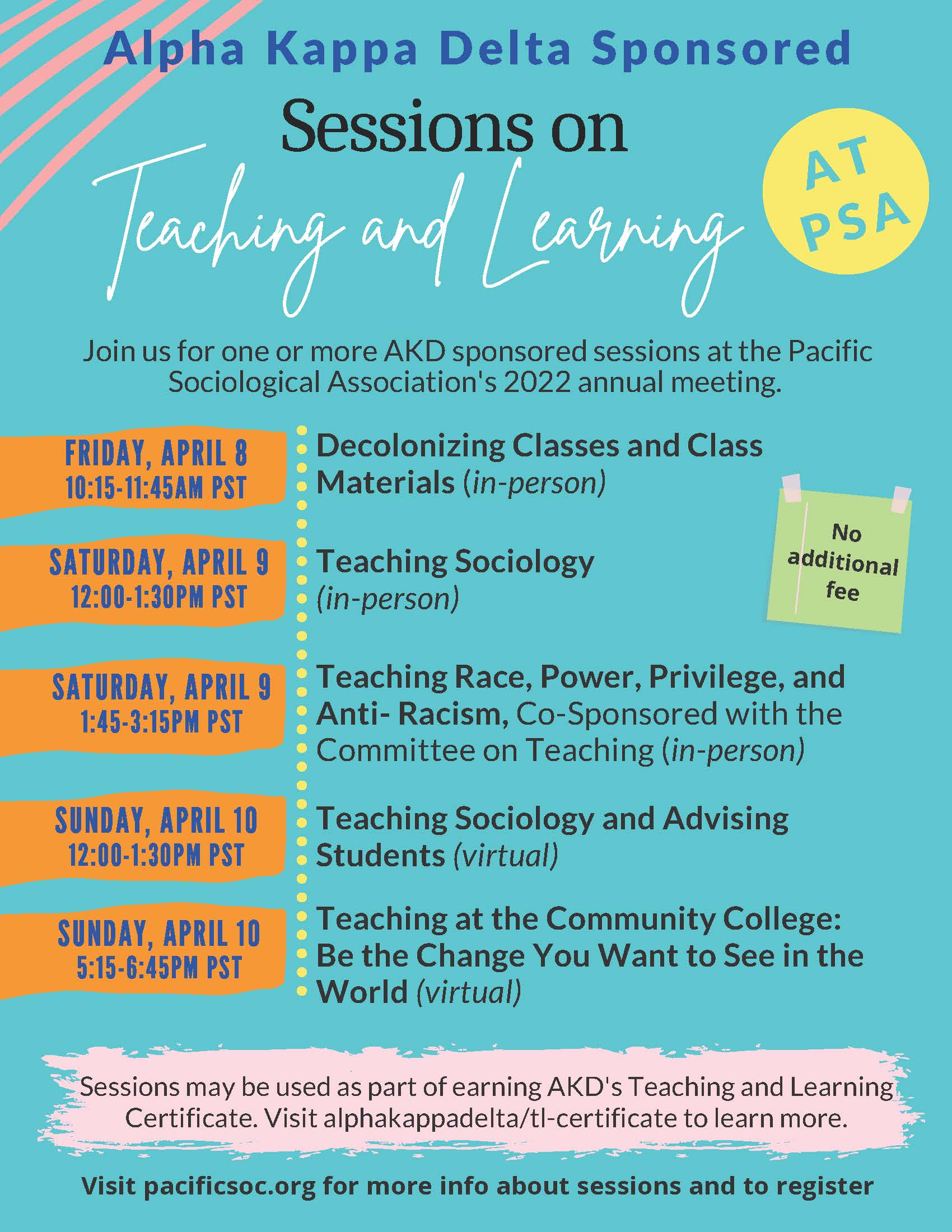2022 Conference Theme and Information
Pacific Sociological Association 2022 Conference Theme
 Telling Our Stories: Collective Memory and Narratives of Race, Gender, and Community Identity
Telling Our Stories: Collective Memory and Narratives of Race, Gender, and Community Identity
The study of collective memory is an interdisciplinary and intersectional nexus of several disciplines. Claimed by sociology, history, and cultural studies, each brings methodological and theoretical approaches enriching the panorama of dialogue in the field of memory studies. As sociologists how do we use the canon of our discipline, the theories that engage our discipline into that of memory and the collective consciousness of our society? How do we use memory as agency in disrupting power and systematic inequality, and as a tool for change and action? The Pacific Sociological Association 2022 meeting theme invites participants to engage in challenging of our histories, memories, new and old, we will explore macro and micro perspectives on individual and collective memory in our social world.
Our collective memory has now begun to acknowledge difficult and traumatic past events:
- The disappearance of native children in Canada’s boarding schools
- The Tulsa Massacre
- The internment of Japanese Americans during World War II
- The Holocaust
- Rape, abuse, incest, and other forms of sexual violence
How has memory of past events brought forward actions towards justice?
How has the narrative about the symbols of past injustices, monuments, names, and invisible historical events changed such that there is a retelling of the narrative?
How do we deal with questions of authenticity in reclaiming memory? Whose memory tells the story?
The 2022 PSA Annual Meeting in Sacramento, California will give our community a chance to reconnect and join in celebrating our return to an in-person gathering. We welcome your input and suggestions for panelists and topics for this meeting.
Wendy Ng, California State University East Bay
PSA President, 2022
Patricia Drew, California State University East Bay
Program Chair 2022
President’s Welcome
The 93rd annual meeting of the Pacific Sociological Association is quickly approaching: April 7 – 10, 2022. We are thrilled to gather together in person in Sacramento after two years of separation. Our in-person conference days will allow for socializing and networking, and will enable us to recognize the important work that sociologists have done in the last year! We are also glad to support the hotel and restaurant service workers in the state capital during these trying times. Truly, this will be a celebration worthy of your support.
Improving public health conditions and declining Covid rates are encouraging, and we will continue to monitor health conditions to ensure the safety of PSA participants. The PSA will follow state, country, and city health requirements for in-person gatherings. As the conference date draws closer, we will inform participants of any new health requirements, such as face masks, vaccine or testing self-attestations.
While the vast majority of conference events will be held in-person between April 7-9, we will host online sessions on April 10. All of PSA’s meeting days will be filled with a great array of sessions related to both traditional topical areas and our 2022 theme, “Telling Our Stories: Collective Memory and Narratives of Race, Gender, and Community Identity.” Each morning, the PSA will provide a hosted breakfast and coffee to help fuel your day: sessions, workshops, and receptions abound! Here are just a few of the scheduled in-person events:
On Thursday, April 7th, Mary Romero will present the 2022 Sociological Star Speaker lecture, “Challenging Myths of the Promised Life: Memories of Social Justice Struggles”: Over the decade, dominant themes in sociology depicting the social mobility and integration of women and men of color in the U.S. have perpetuated the myths of meritocracy, opportunity, and the American Dream. Conceptualizing various versions of assimilation, sociologists have devoted countless studies measuring and observing behaviors deemed as absorbing the ideas, beliefs, and traditions of whiteness and ways of living under capitalism. Conforming through assimilation is the path to the promised life in notions of the American Dream. In the process, memories are reconstructed to celebrate rugged individualism and claiming to have pulled oneself up by their boot’s straps. This reconstruction is an essential step in erasing memories of social justice struggles. This keynote address examines the reconstruction of the promised life and highlights the ways that marginalized groups are reclaiming their memories of social justice struggles and how sociologists can contribute to recovering our collective consciousness that can be instrumental in disrupting power and systematic inequality.
Dennis Downey, PSA’s 2020 President, will facilitate a panel discussion on Thursday April 7th, “Sociology in a Divided Democracy”: Polarization is a critical concern of our times, and a significant threat to many of the goals that sociology has traditionally sought. While popular analyses of American socio-political polarization have presented dire warnings (for example, of the “lure of authoritarianism” and the “death of democracy”) academic analyses have been more circumspect (highlighting complexities and debating whether polarization is an appropriate framework). The address begins by reviewing analyses of our contemporary divisions and argues that understanding its dynamics is critical for an effective sociology – and that a renewed focus on persuasion, with particular attention to distinct moral frameworks, is critical for a discipline that can contribute toward bending the arc of the moral universe toward justice. The presentation advocates for an emphasis on three strategic areas of our discipline: Social Movement research to reassess the role of suasion in social change; Rural Sociology to cultivate and harvest a deeper understanding of the grievances and hopes across the divide; and the interdisciplinary terrain of Cognitive/Political/Moral Psychology to integrate essential insights beyond the discipline about how to engage more effectively across the divide. Responses to the presentation will be made by experts from each of those fields – followed by a broader conversation about contemporary polarization and the possible roles of sociology in this context.
Rhacel Salazar Parreñas will give the Sorokin Lecture, sponsored by the American Sociological Association, on Friday, April 8th, discussing “Unfree: Migrant Domestic Workers in Arab States.” Rhacel Salazar Parreñas is Professor of Sociology and Gender and Sexuality Studies at the University of Southern California. She writes on the labor and migration of women from the Philippines. In 2019, she was recognized with the Jessie Bernard Award by the American Sociological Association.
On Friday, April 8th, the PSA will host the 93rd Presidential Address and Awards Ceremony. PSA President Wendy Ng’s address will connect to the conference theme: “Telling Our Stories: Collective Memory and Narratives of Race, Gender, and Community Identity.” Her talk will focus on the questions that form the basis of our own sociological inquiries, personal and political, and how that extends to the larger spectrum of how sociologists must use historical memory as a point of departure for justice, action, and reparations. Wendy Ng is currently Dean of the College of Letters, Arts, and Social Sciences at CSU-East Bay.
Special Sessions and Events at the PSA 2022 Conference
Presidential Sessions
Thursday, 3:30 pm: Presidental Session: Black Collective Memory
Critical reflections on Black collective memory engaging diasporic experiences. Authors interrogate white supremacy, war, colonialism, anti-Black racism, state and media manipulations as they impact Black collective memory, emphasizing how these are met with resistance.
Organizer, Presider, & Discussant: Sharon Elise, California State University San Marcos
- The Hauntings of War: Embodied Memories of the Somali Civil War, Mohamed Abumaye, California State University San Marcos
- “Desert Gypsies”, “Warlords” and “Masters of Confusion”: Pedagogies of Violence and Somali Resistance in Canada, M. Udbi Ali, York University
- Sankofa and the Relevance of African Nova Scotians’ Collective Memory in the Present for the Future, Johanne Jean-Pierre, Ryerson University
- Bringing African Art Back Home: A Decolonial Move to Reclaiming African Cultural Heritage, Gloria Pindi, California State University San Marcos
- Correcting Collective Amnesia: A Black Feminist Approach to Pop Criminology, Lori Walkington, California State University San Marcos
Thursday, 8 pm: Sociology in a Divided Democracy (2020 Presidential Address & Panel/Discussion)
Polarization is a critical concern of our times, and a significant threat to many of the goals that sociology has traditionally sought. While popular analyses of American socio-political polarization have presented dire warnings (for example, of the “lure of authoritarianism” and the “death of democracy”) academic analyses have been more circumspect (highlighting complexities and debating whether polarization is an appropriate framework). The address begins by reviewing analyses of our contemporary divisions and argues that understanding its dynamics is critical for an effective sociology – and that a renewed focus on persuasion, with particular attention to distinct moral frameworks, is critical for a discipline that can contribute toward bending the arc of the moral universe toward justice. The presentation advocates for an emphasis on three strategic areas of our discipline: Social Movement research to reassess the role of suasion in social change; Rural Sociology to cultivate and harvest a deeper understanding of the grievances and hopes across the divide; and the interdisciplinary terrain of Cognitive/Political/Moral Psychology to integrate essential insights beyond the discipline about how to engage more effectively across the divide. Responses to the presentation will be made by experts from each of those fields – followed by a broader conversation about contemporary polarization and the possible roles of sociology in this context.
Panelists: Dennis Downey, California State University Channel Islands; Nella Van Dyke, University of California Merced; Jennifer Sherman, Washington State University; Rengin Firat, Korn Ferry Institute; Shirley A. Jackson, Portland State University
Friday, 3:30 pm: Presidential Session: Moving to the Dark Side: Why Colleges and Universities Need More Sociologists as Leaders and Administrators
An academic career as a sociologist can often go beyond teaching and research: It can involve a career of administrative leadership in a university or college. Sociologists are well-equipped with organizational and analytical tools of the discipline to become a part of higher education administration. Sociologists have an understanding and training that can facilitate greater dialogue, empathy, understanding of practices of diversity and inclusion that are essential in institutions today. This panel profiles sociologists currently working in higher education administration, as provosts, deans and associate deans, and vice presidents and how they made the move to “the dark side.”
Organizer & Presider: Wendy Ng, California State University East Bay
Panelists: Brianne Davila, California State Polytechnic University Pomona; Dennis Downey, California State University Channel Islands; Kim Greer, California State University East Bay; Walt Jacobs, San Jose State University; Todd Migliaccio, Pennsylvania State University, Berks
Friday, 7 pm: Presidential Address (Wendy Ng) and Awards Ceremony
2022 PSA awards will be presented, followed by President Wendy Ng’s Address on the conference theme: “Telling Our Stories: Collective Memory and Narratives of Race, Gender, and Community Identity.” Her talk will focus on the questions that form the basis of our own sociological inquiries, personal and political, and how that extends to the larger spectrum of how sociologists must use historical memory as a point of departure for justice, action, and reparations. Wendy Ng is currently Dean of the College of Letters, Arts, and Social Sciences at CSU-East Bay.
Saturday, 12 pm: Presidential Session: Featured Speaker:”We Hereby Refuse: Japanese American Resistance to Wartime Incarceration” Frank Abe, Journalist and Documentary Filmmaker
Reconstructing and reframing the collective narrative of Japanese American Incarceration: Graphic novels open the door to alternative narratives from hitherto-marginalized communities, while engaging reader empathy. Lead author Frank Abe will present the text and artwork of We Hereby Refuse, and show how they work together to subvert the prevailing victim narratives of shikataganai (passive compliance with wartime incarceration), and go for broke (patriotic self-sacrifice to prove their loyalty). He will show how the work reframes the epic narrative of wartime incarceration through a rigorous examination of how incarcerees responded to the U.S government’s use of such legal and administrative tools as loyalty questionnaires, false constructions of loyalty and disloyalty, segregation based upon answers to those questionnaires, repatriation, resegregation, denationalization, and renunciation of U.S. citizenship. These actions created divisions among the incarcerees that persist within the Japanese American community to this day.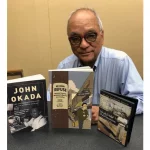
Frank Abe has worked over four decades to reclaim and recover the story of wartime incarceration. He helped create the Days of Remembrance that kick-started the popular campaign for governmental apology and redress. He produced a film for PBS on the largest organized resistance to incarceration, Conscience and the Constitution. His biography of novelist John Okada uncovered the story behind the landmark novel No-No Boy and won an American Book Award. His new graphic novel, We Hereby Refuse: Japanese American Resistance to Wartime Incarceration, is based upon painstaking historical research and reconstruction. More information: https://resisters.com/author/frankabe/
Saturday, 3:30 pm: Presidential Session: Diverse Intersections: Memory, History, Identity, and Community
This panel explores community histories and identities through historic artifacts, photographs, testimonio, and intergenerational dialogue in academic settings as well as through community-based organizations.
Organizer: Wendy Ng, California State University East Bay
- MiHistoria: Bridging Community Through Testimonio, Albertina Zarazua Padilla, Executive Director, MiHistoria
- Her Own Private Stage: Photography and Archiving as Black Migrant Women’s Visual Worldmaking, Wendy M. Thompson, San Jose State University
- Amplifying Our APIDA Elders’ Voices in the Fight for Justice and Civil Rights: Cross-Generational Community Collaborations in Santa Clara County, Yvonne Kwan, San Jose State University
Sessions sponsored by PSA Committees and Sister Organizations
Note: Sessions sponsored by Alpha Kappa Delta (AKD) can be used towards their Teaching & Learning Certificate.
Thursday, 5:15 pm: Sociological Star Speakers Series: Challenging Myths of the Promised Life: Memories of Social Justice Struggles—Mary Romero (sponsored by the Emeritus and Retired Sociologists Committee)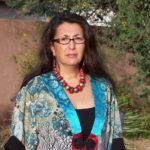
Over the decade, dominant themes in sociology depicting the social mobility and integration of women and men of color in the U.S. have perpetuated the myths of meritocracy, opportunity, and the American Dream. Conceptualizing various versions of assimilation, sociologists have devoted countless studies measuring and observing behaviors deemed as absorbing the ideas, beliefs, and traditions of whiteness and ways of living under capitalism. Conforming through assimilation is the path to the promised life in notions of the American Dream. In the process, memories are reconstructed to celebrate rugged individualism and claiming to have pulled oneself up by their boot’s straps. This reconstruction is an essential step in erasing memories of social justice struggles. This keynote address examines the reconstruction of the promised life and highlights the ways that marginalized groups are reclaiming their memories of social justice struggles and how sociologists can contribute to recovering our collective consciousness that can be instrumental in disrupting power and systematic inequality.
Friday, 10:15 am: Decolonizing Classes and Class Materials (sponsored by Alpha Kappa Delta)
- Centering Indigenous Cosmologies in Environmental Sociology, Jimiliz Valiente-Neighbours, Point Loma Nazarene University
- Southern Border Pedagogy, Stephanie Anckle, University of Nevada Las Vegas
- Decolonizing the Syllabus: Practical Changes and Lessons Learned from a University Learning Community, Karma Rose Zavita, University of California Irvine; Brandon Golob, University of California Irvine
- Mentoring Students With Marx, Michel Estefan, University of California San Diego
- Engaging the Sociological Imagination through Children’s Book Writing, Jessica Kizer, Pitzer College
Friday, 12 pm: Lessons Learned from 2020: How Faculty, Staff, and Administrators are Moving Forward (Doing Racial Justice Work in the Community, Academy, & Leadership Positions, Sponsored by Committee on the Status of Racial and Ethnic Minorities)
Panelists will talk about the challenges, successes, and unexpected events, as well as some of the important lessons they learned this past year that served as teachable, “magnified” moments. The panel will highlight what is new, transformative– or remains the same– in regard to the campus climate, workload, and expectations of students and colleagues after living with a global pandemic, a volatile election season, and renewed demands for racial justice as a priority in higher education.
Organizer & Presider: Marcia Hernandez, University of the Pacific
Panelists: Celeste Atkins, University of Arizona; Alicia Bonaparte, Pitzer College; Margaret Hunter, University of California Berkeley; Annika Anderson, CSU San Bernardino
Friday, 1:45 pm: Surviving and Thriving in the Job Market as an Ethnic Studies and Interdisciplinary Scholar (Professional Development Workshop sponsored by the Committee on the Status of Racial and Ethnic Minorities)
This workshop will focus on job market strategies for people searching for positions in Ethnic Studies and Sociology departments with an interdisciplinary focus. The discussion will focus on the search process, how to position yourself as a strong candidate, and tips for the on-campus interview.
Organizer: Marcia Hernandez, University of the Pacific
Presider: Elvia Ramirez, California State University Sacramento
Panelists: Shirley A. Jackson, Portland State University; Kathy Yep, Pitzer College; Elvia Ramirez, California State University Sacramento
Friday, 3:30 pm: Negotiating the Pandemic: Intersections of Lifecourse and Class (sponsored by the Committee on the Status of Women)
- Social Satisfaction for People with and without Disabilities During the COVID-19 Pandemic, Brent Chamberlain, Keunhyun Park,Teresa Larsen, Valerie Novack, Sam Johnson, Jefferson Sheen, Carlos Licon, and Keith Christensen, Utah State University
- Being “Essential” with Minimum Wages: The Experiences of the COVID-19 Restrictions Among Working Young Adults, Hien Park, Vanguard University
- College Living and Learning Spaces and the Transition to Adulthood during COVID-19, Michelle Janning, Whitman College
Friday, 5:15 pm: Unfree: Migrant Domestic Workers in Arab States (Rhacel Salazar Parreñas; Sorokin Lecture, sponsored by the American Sociological Association)
 BIO: Rhacel Salazar Parreñas is Professor of Sociology and Gender and Sexuality Studies at the University of Southern California. She writes on the labor and migration of women from the Philippines. Her latest book Unfree: Migrant Domestic Work in Arab States was published by Stanford University Press. In 2019, she was recognized with the Jessie Bernard Award by the American Sociological Association. More information: https://rhacelparrenas.com/home/about/
BIO: Rhacel Salazar Parreñas is Professor of Sociology and Gender and Sexuality Studies at the University of Southern California. She writes on the labor and migration of women from the Philippines. Her latest book Unfree: Migrant Domestic Work in Arab States was published by Stanford University Press. In 2019, she was recognized with the Jessie Bernard Award by the American Sociological Association. More information: https://rhacelparrenas.com/home/about/
Saturday, 10:15 am: Modern Slavery in California Agriculture (Doing Racial Justice Work in the Community, Academy, & Leadership Positions, sponsored by the Committee on the Status of Racial and Ethnic Minorities, Education, etc.)
The San Joaquin Valley feeds the nation producing 2/3 of fruits and 1/3 of the vegetables for the nation, but remains among the poorest regions in the country. Many racialized ethnicities have historically been incorporated as exploitable labor into this region but some remain at the margins to this day. Grounded in lived experience and/or long-time organizing with farm working communities, the panelists provide insights and understandings that illuminate the expressions of modern slavery in California Agriculture. An objective of this panel is to advance understanding, equity, and dignity to the essential workers in the fields of the most affluent state in the nation and 5th largest economy in the world.
Organizer & Presider: Manuel Barajas, California State University Sacramento
Panelists: Ann Aurelia Lopez, Center for Farmworker Families; Irene de Barraicua, Lideres Campesinas (Organizacion de Lideres Campesinas en California, Inc.) [Farmworking Women Leaders]; Luis Magaña, Organizacion de Trabajadores Agricolas de California (OTAC) [Organization of Farmworkers in California]; Eduardo Lievanos, University of Colorado Boulder
Saturday, 12 pm: Teaching Sociology, sponsored by Alpha Kappa Delta
- Teaching to Transgress in the Virtual Classroom: Tools for Implementing the Guerrilla Girls’ “Art of Complaining”, Jamie Palmer, Nevada State College
- Developing a Faculty-Librarian Partnership for Information Literacy in Introduction to Sociology, Marcia Hernandez and Michelle Maloney, University of the Pacific
- One Large Stone – Using Qualifying Exam Materials to Design a Future Course, Elisabeth Shimada, Mary Ippolito, and Brigid Cotter, University of Southern California
- How to Support Sociology Graduates Navigating Barriers to Making Systems Change, Sophie Nathenson, Oregon Institute of Technology
- Pandemic Pedagogy: Digital PowerUps Offering A Dynamic Virtual Community, Mehmet Soyer, Gonca Soyer, Travis Thurston, and Gina McCrackin, Utah State University
Saturday, 12 pm: Panel on Edited Volume: Gender, Race, and Class in the Lives of Today’s Teachers: Educators at Intersections (sponsored by the Committee on the Status of Racial and Ethnic Minorities and Education)
Several invited discussants share their comments and critique of the book, GENDER, RACE, AND CLASS IN THE LIVES OF TODAY’S TEACHERS (Springer, 2021)—the first, interdisciplinary edited volume focused on educators’ experiences of gender, race, and class in their professional lives.
These discussants include AC Campbell of Santa Ana College and Elizabeth Bennett of Central New Mexico Community College. Co-editors Dr. Lata Murti (University of Massachusetts Global) and Dr. Glenda M. Flores (University of California, Irvine), as well as four of the book’s authors: Dr. Celeste Atkins (University of Arizona); Juan Gaytan (University of California, Irvine); and Edward Watson (University of California, Irvine) respond to the comments and critique.
Saturday, 1:45 pm: Teaching Race, Power, Privilege, and Anti-Racism, sponsored by the Committee on Teaching and Alpha Kappa Delta
- DEI Efforts at a California Community College, Anthony Villarreal, Monterey Peninsula College
- Teaching Critical Race Theory at a Conservative Christian University, Daniel Morrison, Abilene Christian University
- Coordinating Student Online Debates About Contentious Issues in Criminal Justice, Stephen Van Geem, Utah State University
- E.B. DuBois & Double Consciousness: The Sociology of Race Honors Option Project, Sean Martin Cranley, Antelope Valley College
- Backfire Effect: Exploring Our Own Positionality and Racial Hegemony, Hee Eun Kwon, University of California San Diego
Saturday, 3:30 pm: Just Coffee: Social Gathering and Fishbowl Activity, sponsored by the Committee on Rights, Liberties, and Social Justice
The Committee on Rights, Liberties, and Social Justice invites PSA members to take a “coffee break” with us during the conference in order to come together in the interest of the committee’s mission, “to support the integration of social justice issues in academia and raise awareness of civil rights pedagogy for faculty working with students and community partners…and to promote and foster a community within Pacific Sociological Association that is committed in social activism.”
For the 2022 PSA meeting we envision Just Coffee as an undergraduate student “fishbowl” conversation about ways that faculty can do a better job of centering marginalized students’ needs and feelings during difficult dialogues in the classroom. We are hearing from our BIPOC students that discussions about white supremacy, racism, and police violence, as well as the multiple ways people are resisting these things, are happening with more frequency and intensity in the classroom. While this is a good sign of progress, particularly for white people and other privileged groups who appear to be experiencing a rapid consciousness raising moment right now, there are costs to the BIPOC students who have to manage the ignorant comments, microaggressions, and exploitation of BIPOC trauma that often accompanies these learning moments in the classroom. Recognizing that most faculty are not equipped to successfully facilitate discussions like this, but are eager to build their chops, we hope to create a learning opportunity for faculty to hear from students themselves about ways they can improve the in-class experience for their BIPOC students.
VIRTUAL Sunday, 12 pm: Teaching Sociology and Advising Students, sponsored by Alpha Kappa Delta
- Sociology Advising Models that Address Equity Gaps, Mariam Ashtiani, Devon Thacker Thomas, and Anthony Alvarez, California State University Fullerton
- Online Course Redesigns: Insights and Pitfalls, Matthew Gougherty, Eastern Oregon University
- Increasing Student Engagement with a Solutions-Oriented Approach to Teaching Social Problems, Jennifer Rosen, Solutions Journalism Network
- Teaching Semipensante Pedgagogy: Creating a Multi-layered Classroom, Arlett Lomeli, The University of Texas, Rio Grande Valley
- Revisiting Intersections of Gender, Race, and Class in Introductory Textbooks: OER Alternatives, Jennifer Puentes and Matthew Gougherty, Eastern Oregon University
VIRTUAL Sunday, 5:15 pm: Teaching At The Community College: Be the Change You Want to See in the World, sponsored by Alpha Kappa Delta
Organizer & Presider: Celeste Atkins, University of Arizona
Panelists: Elizabeth Bennett, Central New Mexico Community College; Linda Rillorta, Mt. San Antonio College; David Hyde, South Puget Sound Community College; Alondo (A.C.) Campbell, Santa Ana College
Book Salons
Friday, 12:00-1:30 pm Critical Mass: Understanding and Fixing Mass Shootings in the United States, by Dinur Blum and Christian Gonzalez Jaworski (Routledge, 2021)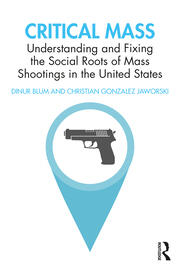
This book examines social patterns in 2,000 mass shootings in the United States between 2013 through 2020. While mass shootings are often described as psychological, the authors show that there are social factors that produce the anger needed to commit a mass shooting. These factors are fairly common and can be addressed to stem the anger earlier. The factors include chronic poverty, sudden unemployment, relationship problems, domestic violence, social isolation, and alcohol. Common social strains can metastasize and be lethally dangerous. By understanding the social factors, we can reduce the anger and frustration people feel that would drive them to killing others.
Saturday, 10:15-11:45 am The Souls of White Jokes: How Racist Humor Fuels White Supremacy, by Raúl Pérez (coming July 2022, Stanford University Press)
 A rigorous study of the social meaning and consequences of racist humor, and a damning argument for when the joke is not just a joke. Having a “good” sense of humor generally means being able to take a joke without getting offended—laughing even at a taboo thought or at another’s expense. The insinuation is that laughter eases social tension and creates solidarity in an overly politicized social world. But do the stakes change when the jokes are racist? In The Souls of White Jokes Raúl Pérez argues that we must genuinely confront this unsettling question in order to fully understand the persistence of anti-black racism and white supremacy in American society today.
A rigorous study of the social meaning and consequences of racist humor, and a damning argument for when the joke is not just a joke. Having a “good” sense of humor generally means being able to take a joke without getting offended—laughing even at a taboo thought or at another’s expense. The insinuation is that laughter eases social tension and creates solidarity in an overly politicized social world. But do the stakes change when the jokes are racist? In The Souls of White Jokes Raúl Pérez argues that we must genuinely confront this unsettling question in order to fully understand the persistence of anti-black racism and white supremacy in American society today.
W.E.B. Du Bois’s prescient essay “The Souls of White Folk” was one of the first to theorize whiteness as a social and political construct based on a feeling of superiority over racialized others—a kind of racial contempt. Pérez extends this theory to the study of humor, connecting theories of racial formation to parallel ideas about humor stemming from laughter at another’s misfortune. Critically synthesizing scholarship on race, humor, and emotions, he uncovers a key function of humor as a tool for producing racial alienation, dehumanization, exclusion, and even violence. Pérez tracks this use of humor from blackface minstrelsy to contemporary contexts, including police culture, politics, and far-right extremists. Rather than being harmless fun, this humor plays a central role in reinforcing and mobilizing racist ideology and power under the guise of amusement.
The Souls of White Jokes exposes this malicious side of humor, while also revealing a new facet of racism today. Though it can be comforting to imagine racism as coming from racial hatred and anger, the terrifying reality is that it is tied up in seemingly benign, even joyful, everyday interactions as well— and for racism to be eradicated we must face this truth.
About the author
Raúl Pérez is Assistant Professor of Sociology at the University of La Verne. His work has been published in American Behavioral Scientist, Discourse and Society, Ethnicities, and Sociological Perspectives, and featured in Time, The Grio, Latino Rebels, and Zócalo Public Square.
Saturday, 10:15-11:45 am Gentrification in the Rural West: Pushed Out: Contested Development and Rural Gentrification in the US West, by Ryanne Pilgeram (2021, University of Washington Press) and Dividing Paradise: Rural Inequality and the Diminishing American Dream, by Jennifer Sherman (2021, UC Press)
Pushed Out: Contested Development and Rural Gentrification in the US West
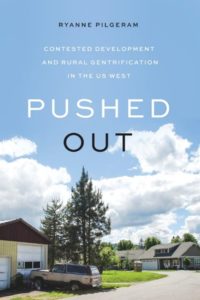 What happens to rural communities when their traditional economic base collapses? When new money comes in, who gets left behind? Pushed Out offers a rich portrait of Dover, Idaho, whose transformation from “thriving timber mill town” to “economically depressed small town” to “trendy second-home location” over the past four decades embodies the story and challenges of many other rural communities.
What happens to rural communities when their traditional economic base collapses? When new money comes in, who gets left behind? Pushed Out offers a rich portrait of Dover, Idaho, whose transformation from “thriving timber mill town” to “economically depressed small town” to “trendy second-home location” over the past four decades embodies the story and challenges of many other rural communities.
Sociologist Ryanne Pilgeram explores the structural forces driving rural gentrification and examines how social and environmental inequality are written onto these landscapes. Based on in-depth interviews and archival data, she grounds this highly readable ethnography in a long view of the region that takes account of geological history, settler colonialism, and histories of power and exploitation within capitalism. Pilgeram’s analysis reveals the processes and mechanisms that make such communities vulnerable to gentrification and points the way to a radical justice that prioritizes the economic, social, and environmental sustainability necessary to restore these communities.
Dividing Paradise: Rural Inequality and the Diminishing American Dream, by Jennifer Sherman
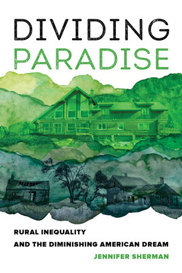 Late-stage capitalism is trying to remake rural America in its own image, and the resistance is telling. Small-town economies that have traditionally been based on logging, mining, farming, and ranching now increasingly rely on tourism, second-home ownership, and retirement migration. In Dividing Paradise, Jennifer Sherman tells the story of Paradise Valley, Washington, a rural community where amenity-driven economic growth has resulted in a new social landscape of inequality and privilege, with deep fault lines between old-timers and newcomers. In this complicated cultural reality, “class blindness” allows privileged newcomers to ignore or justify their impact on these towns, papering over the sentiments of anger, loss, and disempowerment of longtime locals.
Late-stage capitalism is trying to remake rural America in its own image, and the resistance is telling. Small-town economies that have traditionally been based on logging, mining, farming, and ranching now increasingly rely on tourism, second-home ownership, and retirement migration. In Dividing Paradise, Jennifer Sherman tells the story of Paradise Valley, Washington, a rural community where amenity-driven economic growth has resulted in a new social landscape of inequality and privilege, with deep fault lines between old-timers and newcomers. In this complicated cultural reality, “class blindness” allows privileged newcomers to ignore or justify their impact on these towns, papering over the sentiments of anger, loss, and disempowerment of longtime locals.
Based on in-depth interviews with individuals on both sides of the divide, this book explores the causes and repercussions of the stark inequity that has become commonplace across the United States. It exposes the mechanisms by which inequality flourishes and by which Americans have come to believe that disparity is acceptable and deserved. Sherman, who is known for her work on rural America, presents here a powerful case study of the ever-growing tensions between those who can and those who cannot achieve their visions of the American dream.
Saturday, 12-1:30 pm Panel on Edited Volume: Gender, Race, and Class in the Lives of Today’s Teachers: Educators at Intersections, edited by Lata Murti and Glenda M. Flores (SpringerLink, 2021)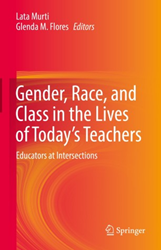
- First interdisciplinary, comprehensive volume focusing on the inextricable link of gender, sexualities, race and class in an educator’s professional life in diverse settings
- Provides a comprehensive overview on intersectionalities and teachers of color from a variety of teaching contexts and formats
- Presents some of the first studies of intersectionality in the lives of LGBTQ educators
- Helps to understand the racial, gender and class experiences of today’s teachers to recruit and retain a more diverse teacher workforce
- Centers subaltern voices in multiple areas of education and teacher education in a novel way
Saturday, 1:45-3:15 pm No Real Choice: How Culture and Politics Matter for Reproductive Autonomy, by Katrina Kimport (2021, Rutgers University Press)
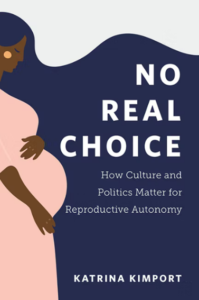 In the United States, the “right to choose” an abortion is the law of the land. But what if a woman continues her pregnancy because she didn’t really have a choice? What if state laws, federal policies, stigma, and a host of other obstacles push that choice out of her reach?
In the United States, the “right to choose” an abortion is the law of the land. But what if a woman continues her pregnancy because she didn’t really have a choice? What if state laws, federal policies, stigma, and a host of other obstacles push that choice out of her reach?
Based on candid, in-depth interviews with women who considered but did not obtain an abortion, No Real Choice punctures the myth that American women have full autonomy over their reproductive choices. Focusing on the experiences of a predominantly Black and low-income group of women, sociologist Katrina Kimport finds that structural, cultural, and experiential factors can make choosing abortion impossible–especially for those who experience racism and class discrimination. From these conversations, we see the obstacles to “choice” these women face, such as bans on public insurance coverage of abortion and rampant antiabortion claims that abortion is harmful. Kimport’s interviews reveal that even as activists fight to preserve Roe v. Wade, class and racial disparities have already curtailed many women’s freedom of choice.
No Real Choice analyzes both the structural obstacles to abortion and the cultural ideologies that try to persuade women not to choose abortion. Told with care and sensitivity, No Real Choice gives voice to women whose experiences are often overlooked in debates on abortion, illustrating how real reproductive choice is denied, for whom, and at what cost.
Saturday, 3:30-5:00 pm Panel on Edited Volume: Impacts of Racism on White Americans in the Age of Trump, Co-Editors Duke Austin and Benjamin Bowser (2021, Palgrave McMillan)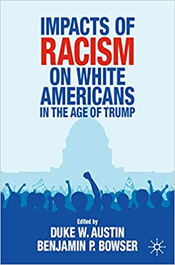
In this entirely new third edition of The Impacts of Racism on White Americans, an exciting range of scholars make the case that racism often negatively affects Whites themselves, especially during the age of Trump. This volume advances the proposition that the problem of race in the U.S. is fundamentally one of White identity and culture, and that racism has substantial negative effects on White Americans through three key areas: (1) Trump-era cultural and institutional racism, bolstered by the use of historical notions of racial hierarchy; (2) institutional and interpersonal racism, which in turn drive individual racist behaviors; and finally, (3) racism’s interactional sequences and how they impact anti-racism efforts.
Looking for Interactive Learning Activities? Check Out These Special Sessions
Friday 5:15-6:45 pm Embodying Our Stories: Integrating Emergent Inclusive Performance into the Sociology Classroom Creative expression is a birthright. Performance and movement in the classroom addresses kinesthetic learning styles and deepens the connection between the physical-social self and can be integrated into teaching pedagogy in sociology classes. Every living body can dance, make music, tell stories and share healing truths. In this workshop CSU East Bay Professor of Inclusive Performance Eric Kupers, along with members of the CSUEB Inclusive Interdisciplinary Ensemble and Dandelion Dancetheater will share radically inclusive approaches to community performance, inviting in each participant’s unique journey through culture, ethnicity, disability/ability, gender, Spirit, and body identities. If you have ever been afraid to participate in dance, music, theater, or other creative expressions, and/or have ever wondered how the arts can advance healing and social justice work, then this workshop is for you. No previous experience necessary. Bring your full self to this inclusive arts inquiry!
Saturday 12-1:30 pm Open Discussion: Rural Sociology This is a place for people interested in rural sociology to come together and talk, facilitated by Ryanne Pilgeram.
Saturday 1:45-3:15 pm Open Discussion: Applied Sociology–Sociology Program Development/Consulting Work and Academic Careers This is a place for people interested in applied sociology/these topics to come together and talk, facilitated by Organizer Sophie Nathenson.
Saturday 3:30-5 pm Just Coffee: Social Gathering and Fishbowl Activity sponsored by the Committee on Rights, Liberties, and Social Justice The committee will lead an activity to promote learning about how to center the needs of BIPOC students in classroom discussions about race/ethnicity and inequalities and avoid adding to trauma. Coffee and treats provided.
Sunday 5:15-6:45 pm VIRTUAL Open Discussion: Anti-Asian Racism This is a space for people to discuss anti-Asian racism, facilitated by Hyeyoung Woo.

